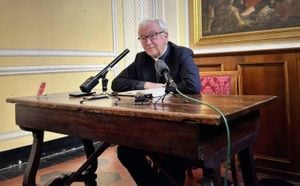Argentina's political and economic territory is undergoing one of its most radical transformations with Javier Milei at the helm. Elected as the first self-identified libertarian president, Milei has promised sweeping reforms aimed at lifting the nation from its economic despair. The question many are asking is whether these policies will serve as the salvation Argentina needs or plunge it even farther down the path of economic chaos.
Milei's administration began with immediate challenges. At the time he took office, Argentina was grappling with staggering inflation rates, hovering around 25% monthly. The dire economic state forced half of the population to live under the poverty line. The outgoing government had resorted to the desperate strategy of printing money to cover expenses, leading to the economic turmoil familiar to many Argentine families. To many, this was seen as governmental negligence, and Milei didn't hesitate to assign blame to what he calls "la casta," the elite political class he argues is out of touch with the struggles of ordinary citizens.
With these high stakes, Milei’s administration quickly moved to implement what they termed libertarian reforms. His first order of business led to claims of unprecedented austerity: he closed nine ministries and slashed spending by approximately 31%. Public sector jobs were cut by the thousands, and changes to regulations echoed through the nation, leaving many startled.
Protests followed swiftly after these changes were announced. Large groups filled the streets of Buenos Aires, as union leaders and ordinary citizens expressed their displeasure. Sylvia Saravia, national coordinator for the left-wing populist party Free Movement of the South, articulated her concerns: "None of what’s happening serves the interests of the people. Fiscal reforms benefit the rich and hurt the poor." The protesters framed Milei's reforms as attacks on working-class rights, fearing significant rollbacks on union power, which could leave workers vulnerable.
Despite the facade of calamity, Milei staunchly defended his drastic measures. Addressing supporters at the end of his first six months, he celebrated earlier predictions of economic decline by citing recent improvements—inflation had dramatically featured less than 4% each month. He spoke with zeal about the country’s potential for recovery, likening economic freedom to prosperity. This viewpoint is shared by some libertarian thinkers who noted Argentina's earlier days as the land of opportunity fueled by free market ideals. For historic perspective, former immigration waves from Europe saw nearly 6.6 million individuals flock to Argentina seeking new beginnings during the late 19th and early 20th centuries.
Attending gleefully to the global stage, Milei has established connections with some noteworthy figures. Elon Musk and GOP candidate Vivek Ramaswamy praised his approach, with Milei even appearing on Ramaswamy's Lex Fridman podcast, where he remarked to them, "My advice would be for them to go all the way, to push it to the very limit, and do not give up.” This camaraderie among leaders promotes Milei's message abroad, prompting speculation about his influence beyond Argentina’s borders.
The juxtaposition of Milei’s supporters against his opponents highlights the rift within Argentine society. Critics argue his policies echo extreme libertarian ideologies, potentially worsening living conditions for the poor, slicing state support, and diminishing the safety nets afforded to many communities. Daniel Aguirre, part of the Argentine Rebel Movement, staunchly claimed, "We must share the wealth. It shouldn’t be concentrated in the hands of the few.” This divergence raises concerns about long-term social stability.
The road to recovery remains fraught with challenges. Argentina's economy, long conditioned to governmental support and welfare, is being thrust headfirst toward market-driven principles, leaving many feeling unprepared. Increased civil unrest through protests and strikes signifies not just political discontent but also reveals the uncertainty citizens feel toward the drastic changes being implemented. Labor unions once wielded considerable power, and their continual ability to mobilize protests showcases the resistance Milei faces.
Returning to the conversation on economic recovery, Javier Milei states confidently, "We were facing what was going to be the worst crisis in all of Argentine history." Despite blows from protests, the federal government has reported outcomes of what they describe as unprecedented growth. Proponents of Milei's reforms assert they are finally correcting decades of governmental mismanagement. Indeed, the narrative built around the administration is focused on re-establishing Argentina's economic independence and restoring its previous glory.
Underlying distrust remains strong, though. Legions of citizens can hardly fathom how repealing established safety nets would yield favorable outcomes. While inflation appears to be scaling back significantly, the starting bar was incredibly low, and many worry about the fallout from Milei's sweeping cuts. The president's steadfast rhetoric prioritizes the visions of rapid recovery and painful sacrifices, but the effects of these decisions will need time to manifest through the social fabric of Argentina.
What looms on the horizon is uncertain. Javier Milei's ambitions rely on more than just ideology; they demand faith and cooperation among the citizens of Argentina, who must decide if they will see themselves as part of the solution or remain entrenched as the opposition. History will judge whether these radical libertarian policies will awaken Argentina from its economic nightmares or reinforce discontent among its populace.
Whether hailed as the harbinger of restoring Argentine greatness or branded as warranting the upheaval of established societal norms, Javier Milei’s administration is transformative. Over the next months, as economic figures roll out and public sentiment shifts—observing the choices made across Buenos Aires, one thing remains clear: the stakes have never been higher for this nation.



